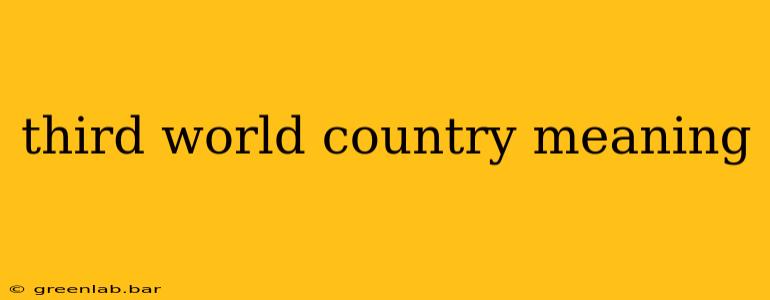The term "Third World country" is loaded with historical baggage and carries significant complexities. While commonly used, it's increasingly viewed as outdated and even offensive due to its inherent biases and lack of precision. Understanding its origins and limitations is crucial to using the term responsibly, if at all.
The Cold War Origins of "Third World"
The phrase emerged during the Cold War, categorizing nations based on their alignment during the geopolitical struggle between the United States (representing the "First World") and the Soviet Union (the "Second World"). "Third World" countries were those that remained non-aligned, often characterized by their newly gained independence from colonial powers and their generally less developed economies.
Beyond Simple Alignment: Economic and Social Factors
While initial categorization focused on geopolitical neutrality, the term quickly became associated with nations facing significant challenges:
- Underdevelopment: Many Third World countries struggled with poverty, limited infrastructure, and lack of access to essential resources like healthcare and education.
- Political Instability: Post-colonial instability, internal conflicts, and weak governance structures were prevalent in many nations labeled as "Third World."
- Economic Dependence: Former colonies often remained economically dependent on their former colonizers, facing exploitative trade practices and limited economic opportunities.
The Problem with "Third World" Today
The term's continued use presents several critical problems:
- Oversimplification: It paints a broad, inaccurate brushstroke over vastly diverse nations. Countries categorized as "Third World" range from relatively prosperous to extremely impoverished, exhibiting a wide spectrum of social, political, and economic conditions.
- Perpetuation of Stereotypes: The term fosters harmful stereotypes, often associating "Third World" with backwardness, instability, and inherent inferiority. This ignores the rich cultural diversity and significant progress made in many developing nations.
- Outdated Classification: The Cold War context that birthed the term is obsolete. The geopolitical landscape has shifted drastically, rendering the original categorization irrelevant.
Preferred Terminology and a More Nuanced Approach
Instead of using "Third World," more accurate and respectful alternatives include:
- Developing countries: This acknowledges the ongoing process of economic and social development.
- Least Developed Countries (LDCs): This term is used by the UN and provides a more precise categorization based on specific economic indicators.
- Emerging markets: This focuses on economic potential and growth.
- Global South: This geographic term encompasses countries in Africa, Latin America, Asia, and the Pacific, highlighting their shared colonial history and common challenges in the global political and economic system.
It’s crucial to describe countries with specificity, acknowledging their unique contexts and avoiding generalizations. Focus on particular economic indicators like GDP per capita, Human Development Index (HDI), or Gini coefficient to paint a more accurate picture.
Conclusion: Moving Beyond Outdated Labels
The term "Third World country" is a relic of a bygone era, carrying significant baggage and promoting inaccurate stereotypes. It's imperative to replace it with more precise and respectful language that acknowledges the complexities and diversity of nations across the globe. Understanding the term's history and its problematic nature allows us to engage with global issues in a more thoughtful and nuanced manner.

